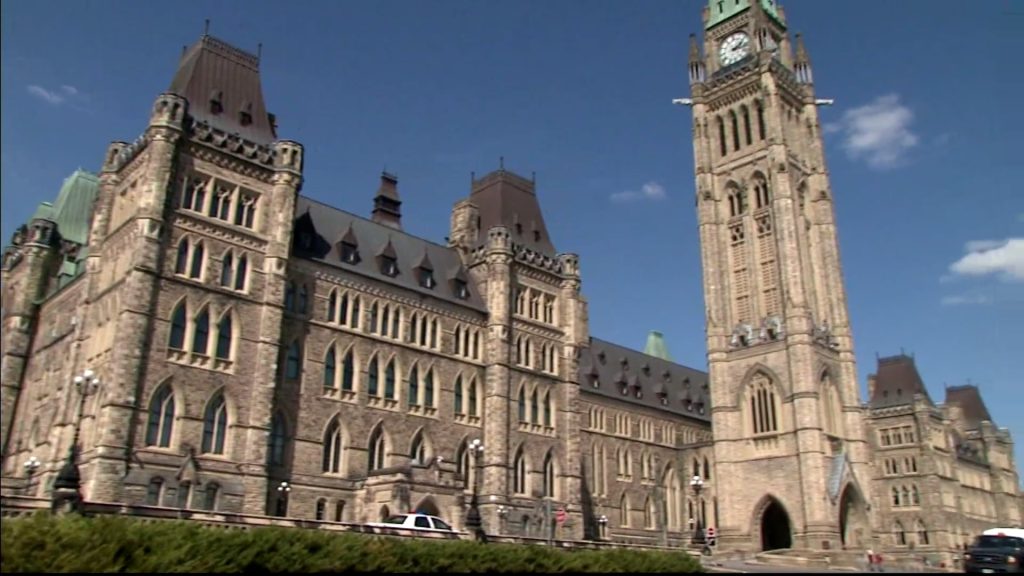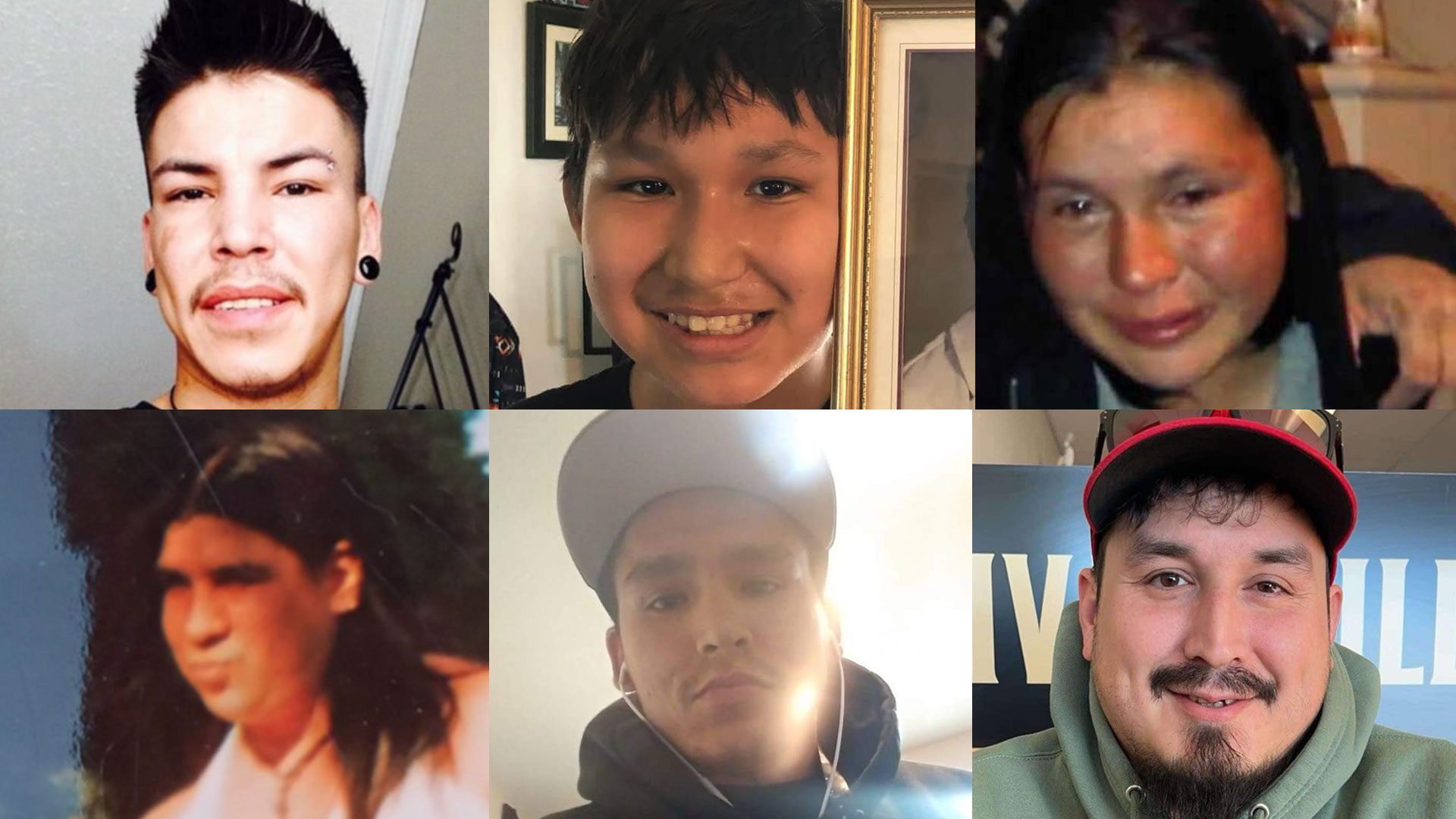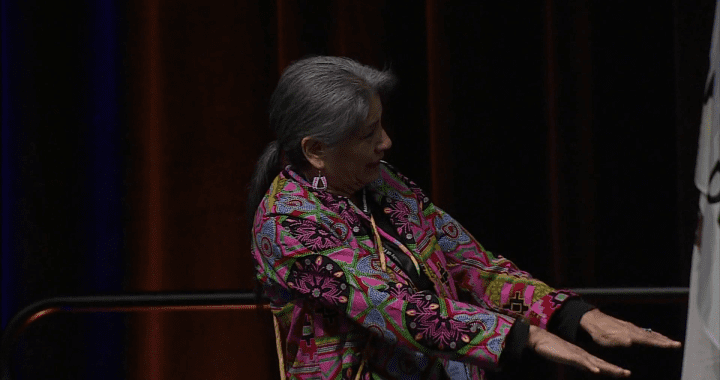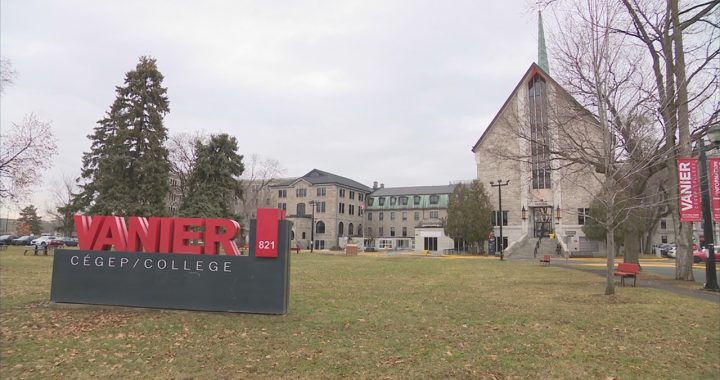
An emergency debate was held in the House of Commons about the six First Nations men and women who died after interacting with police. Photo: APTN file.
There needs to be greater accountability from police services across Canada when it comes to the way they interact with Indigenous Peoples and their communities, says Nunavut MP Lori Idlout.
The New Democrat politician appealed Monday for a number of concrete actions in the wake of the fatal police shootings of six First Nations people between Aug. 29 and Sept. 8.
“Those left behind are forced to grieve not just the loss of their loved ones, but they’re going to have to – for the rest of their lives – question whether they can feel safe with law enforcement,” the Inuk MP told the House of Commons during an emergency debate on the subject Monday night
“We need to do our job to help make sure that First Nations children, women and individuals know that they will be protected, that they will feel safe, when they ask for law enforcement.”

Five males – one a youth – and one woman were either fatally shot or killed by a police cruiser during interactions with the RCMP and municipal police officers.
Idlout said the tragedies have not generated the media coverage they deserve.
Also, she said Parliament needs to make the issue a priority to prevent similar deaths and the continued erosion of the relationship between Indigenous Peoples and police.
“As Canadians we do want to be protected, as Canadians we do want that sense of security, to have that sense of safety,” she said during the debate that transpired during the first day of Question Period and ran until midnight.
“But how can we have it when we have these six individuals over seven days killed by law enforcement?”
Raquel Dancho, a Conservative MP representing Winnipeg’s Kildonan-St. Paul constituency, suggested the Trudeau government had dropped the ball on First Nations policing.
“We know the Liberal government promised to legislate this as an essential service back in 2020, and then again in 2022,” she said. “And, to my knowledge, no legislation has been brought forward, despite the former minister of Public Safety stating on the record that he was ‘working around the clock’.
“So clearly, there’s been a failure to deliver on these promises.”
Idlout agreed the Liberals – with the support of the rest of the House – need to implement the recommendations of the Truth and Reconciliation Commission and National Inquiry into Missing and Murdered Indigenous Women and Girls when it came to First Nations-led police services, cultural awareness training, safety action plans, justice and policing.
“What sparked this emergency debate are the killings of six First Nations people starting on Aug. 29 to Sept. 8. In just 11 days, the Canada police law enforcement killed six people,” Idlout said.
“They were not just regular Canadian people, they were First Nations. This is why this matter is so important.”
Gary Anandasangaree, minister of Crown-Indigenous Relations, said the situation is on his government’s radar.
“We’ve been struggling with the notion of systemic racism in law enforcement for many years and across different jurisdictions,” he told the debate. “In this particular case, they’re in different areas, they involve different police services.
“What would accountability look like,” he asked Idlout, “and what would truth look like in these particular cases? I know it can’t be one particular answer because they’re all different.”
But Idlout said it wasn’t difficult to pinpoint the source.
“RCMP, most of them, have always been people that I can describe as having come from privileged White communities that have not been given the history and experiences of Indigenous Peoples,” she said.
“Part of the reason that systemic racism still exists is because there’s still too much ignorance, there’s still too much denialism about residential schools, for example. That’s how we need to make sure that we’re opening the eyes of Canada.”
Read More:
11 days and 6 First Nations people have died when coming in contact with police across Canada
Cellphone video shows last moments of Cree man’s life
Veteran Ontario MP Charlie Angus (NDP-Timmins/James Bay) said Canada and its Parliament have come a long way in understanding the legacy of the residential school system, but still have more ground to cover.
“An emergency debate about the needless deaths of Indigenous people at the hands of police would have been unimaginable just a few short years ago,” Angus noted. “So we have come down the road, we just haven’t come where we need to be.”
Angus said police services and their officers are struggling, too, with myriad criminal issues and not enough resources.
“These are very complicated times,” he added, “and they don’t have the support that they need, and they don’t have the support in First Nation communities.”
Idlout characterized the string of deaths in Saskatchewan, Alberta, Manitoba, Ontario and New Brunswick as a “disturbing pattern.”
She said the debate was a way for parliamentarians to discuss immediate measures to save Indigenous lives.
Liberal MP Jennifer O’Connell, parliamentary secretary to the public safety minister, said the government has spent millions of dollars on Indigenous policing and other pro-safety initiatives. And, has more plans for how the criminal justice system serves Indigenous people.
But Idlout said the government can’t avoid dealing with the fallout of “genocidal policies” imposed on Indigenous Peoples and must make systemic change.
“Too many lives are at stake,” she noted.
Angus said it was up to the country to set a “higher standard” when it came to policing.
“And that means we put the resources in to protect the communities, the training for police, the mental health supports to treat this holistically, and stop treating this as the colonial shock troops enforcing the treaties on behalf of the White Power state,” he said.
None of the demands or recommendations presented during the emergency debate are binding on the federal government.
Meanwhile, the RCMP issued a statement out of Ottawa late Tuesday in response to the debate.
“The RCMP expresses its sincerest condolences to those impacted by these recent tragedies. These situations are also difficult for our police officers, 911 operators and employees who work tirelessly to serve communities across Canada,” the statement said.
“Independent investigative agencies are currently investigating the actions of our police officers. These investigations are ongoing, which restricts the RCMP’s ability to comment. We have a responsibility to ensure the fairness and transparency of these essential processes.”










